Greek compromise: How Syriza has had to change its plans
- Published

Syriza's headline policy is confronting Greece's "humanitarian crisis"
Syriza, the left-wing party that stormed to power in Greece in January, promised voters it would ditch austerity and renegotiate the country's €240bn (£180bn; $270bn) bailout with the European Union and International Monetary Fund.
But with the terms of the bailout due to expire on 28 February, the new government has been forced to compromise on its campaign pledges and provide a document to convince its international creditors that it can keep its finances afloat and stay in the eurozone.
So what are the aims of a party that was once a wide-ranging far-left coalition that included Maoists, and can it keep its promises to voters, external?

Actions on jobs, wages and poverty
Most eye-catching for Greek voters was the promise of 300,000 new jobs in the private, public and social sectors, and a hefty increase in the minimum monthly wage - from €580 ($658; £433) to €751 ($853; £562).
The new jobs would focus on the young unemployed - almost 50% of under-25s are out of work - and the long-term unemployed, especially those over 55.
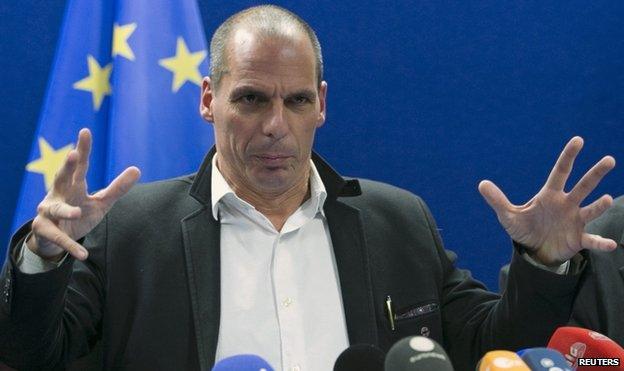
Greek Finance Minister Varoufakis said his government's reforms would "strengthen fiscal sustainability"
But under its reform measures submitted to its creditors and the Eurogroup, the planned increase in the minimum wage becomes an ambition to be put into place "over time". Prime Minister Alexis Tsipras told parliament earlier in February that it would be done gradually by 2016. That could still happen but only in consultation with European partners.
What is less clear is what will happen to the promised job expansion. On 8 February, Mr Tsipras spoke of rehiring finance ministry cleaners and school guards, but the latest proposals only include expanding an existing scheme to provide temporary work for the unemployed and updating the skills of the long-term unemployed.

Power to the people
Syriza came to power promising 300,000 households under the poverty line up to 300 kWh of free electricity per month and food subsidies for the same number of families who have no income. Tax on heating fuel would be scrapped.
There was also a promise to reinstate a Christmas bonus pension for pensioners receiving less than €700 ($795; £524) a month.
Then there were plans for free medical care for those without jobs and medical insurance.
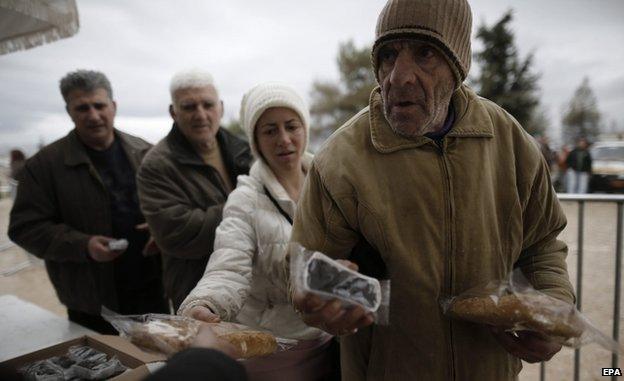
The Greek government has promised to fight homelessness and tackle the seizure of people's homes
In its 23 February compromise, the government maintains its call for universal access to medical services.
It also maintains it will tackle homelessness, food and energy provision while promising that its "fight against the humanitarian crisis has no negative fiscal effect". One key commitment is protection for people with mortgage arrears against the seizure of their property.
However, many Greeks voters will wonder whether some of its pledges have been watered down, as the government's latest plans refer to non-financial offerings such as food stamps.

Debt write-off
The headline-grabbing Syriza policy that shook the eurozone was an initial goal of writing off most of Greece's €322bn ($364bn; £236bn) debt, a colossal 174% of its gross domestic product (GDP).
It also wanted:
Repayment of the remaining debt tied to economic growth, not the Greek budget
A "significant moratorium" on debt payments
The purchase of Greek sovereign bonds under the European Central Bank's €60bn ($68bn; £45bn) monthly programme of quantitative easing
A European Debt Conference modelled on the write-off of half of Germany's post-World War Two debt

A busker plays in front of a sign supporting Greek PM Alexis Tsipras
The write-off never happened - although Syriza has not abandoned the idea - and nor did the moratorium on debt payments.
Syriza had wanted to scrap the bailout, but in reality it has had to fight for a four-month extension of it and roll back on many of its commitments.
But it does appear to have persuaded its creditors to lower Greece's budget surplus target from 4.5%.

Halting privatisations and scrapping property tax
When Syriza came to power it promised to halt a string of privatisations, such as the port of Piraeus and the big energy company, Public Power Corporation of Greece.
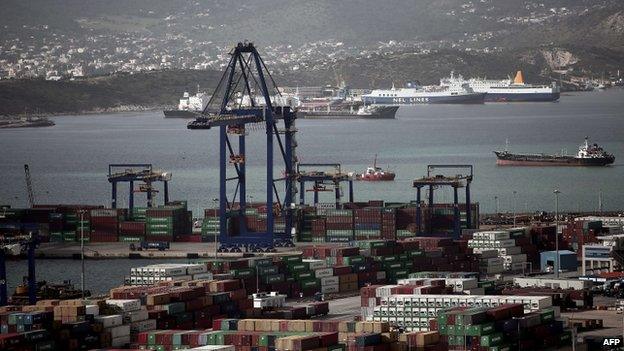
China's Cosco group was among the bidders for a 67% stake in the port of Piraeus
Although it was never likely to roll back privatisations already complete, it has now said it will respect tender processes already under way, which could be seen as a climb down.
A major success for the party was in attracting not just poorer voters but the middle classes as well. Property owners in Athens's leafy, northern suburbs were enticed with the promised abolition of a hated annual levy on private property.
Known as "Enfia", the tax was introduced in 2011 as an emergency measure but made permanent under the previous government.
Although the tax will remain payable for 2014, Syriza plans to replace it with a tax on luxury homes and large second properties.

Paying for it all
Having revised many of its commitments to keep Greece solvent and within the terms of an extended bailout, Greece's Finance Minister Yanis Varoufakis has had to come up with credible ways of funding them all.
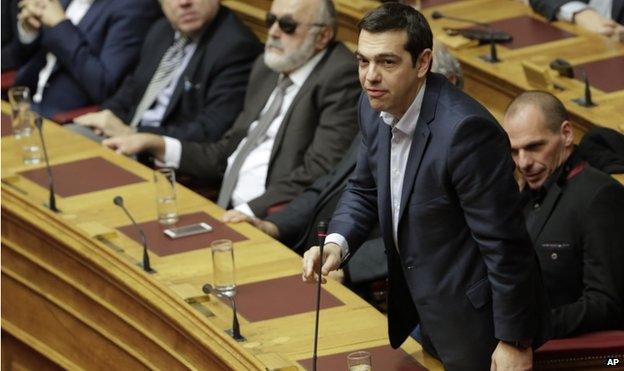
Prime Minister Alexis Tsipras has had to water down many of his election commitments
Greek governments have long struggled to collect taxes and one of Syriza's four pillars was "promoting tax justice" - cracking down on tax evasion, clearing tax arrears and streamlining VAT (sales tax) rates.
A national plan against corruption is being proposed, as is a crackdown on fuel and cigarette smuggling. These were targeted in Syriza's manifesto and again in its 23 February proposals to its creditors.
Public spending in Greece is still seen as high, even after years of cuts, and the government says it will look at savings in every ministry, cutting the number of ministries from 10 to six.
Greece's pension funds have buckled for years under the weight of too many Greeks retiring too early. As many as three quarters seek retirement before the age of 61. Now Syriza has said it will seek to eliminate loopholes and incentives that encourage early retirements, particularly in the banking and public sectors.
- Published27 January 2015
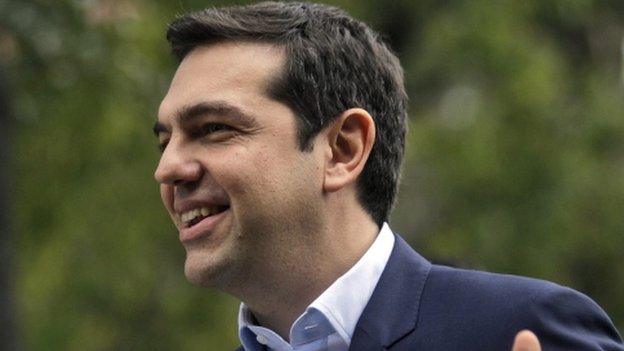
- Published27 January 2015
